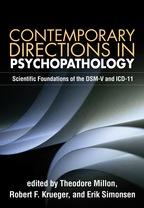Contemporary Directions in Psychopathology
Scientific Foundations of the DSM-V and ICD-11
Edited by Theodore Millon, Robert F. Krueger, and Erik Simonsen
1. A Précis of Psychopathological History, Theodore Millon and Erik Simonsen
2. Themes in the Evolution of the 20th-Century DSMs, Roger K. Blashfield, Elizabeth Flanagan, and Kristin Raley
3. On the Wisdom of Considering Culture and Context in Psychopathology, Joseph P. Gone and Laurence J. Kirmayer
4. Cultural Issues in the Coordination of DSM-V and ICD-11, Renato D. Alarcón
5. A Sociocultural Conception of the Borderline Personality Disorder Epidemic, Theodore Millon
II. Conceptual Issues in Classification
6. Philosophical Issues in the Classification of Psychopathology, Peter Zachar and Kenneth S. Kendler
7. Classification Considerations in Psychopathology and Personology, Theodore Millon
8. Diagnostic Taxa as Open Concepts: Metatheoretical and Statistical Questions about Reliability and Construct Validity in the Grand Strategy of Nosological Revision, Paul E. Meehl
9. Contemplations on Meehl (1986): The Territory, Paul’s Map, and Our Progress in Psychopathology Classification (or, the Challenge of Keeping Up with a Beacon 30 Years Ahead of the Field), Mark F. Lenzenweger
10. Issues of Construct Validity in Psychological Diagnoses, Gregory T. Smith and Jessica Combs
11. The Meaning of Comorbidity among Common Mental Disorders, Nicholas R. Eaton, Susan C. South, and Robert F. Krueger
12. The Connections between Personality and Psychopathology, Susan C. South, Nicholas R. Eaton, and Robert F. Krueger
13. Is It True That Mental Disorders Are So Common, and So Commonly Co-Occur?, Mario Maj
14. Taking Disorder Seriously: A Critique of Psychiatric Criteria for Mental Disorders from the Harmful-Dysfunction Perspective, Jerome C. Wakefield
III. Methodological Approaches to Categories, Dimensions, and Prototypes
15. On the Substantive Grounding and Clinical Utility of Categories versus Dimensions, William M. Grove and Scott I. Vrieze
16. A Short History of a Psychiatric Diagnostic Category That Turned Out to Be a Disease, Roger K. Blashfield and Jared Keeley
17. Concepts and Methods for Researching Categories and Dimensions in Psychiatric Diagnosis, Helena Chmura Kraemer
18. The Integration of Categorical and Dimensional Approaches to Psychopathology, Erik Simonsen
19. Dimensionalizing Existing Personality Disorder Categories, Andrew E. Skodol
20. An Empirically Based Prototype Diagnostic System for DSM-V and ICD-11, Kile M. Ortigo, Bekh Bradley, and Drew Westen
21. The Millon Personality Spectrometer: A Tool for Personality Spectrum Analyses, Diagnoses, and Treatments, Theodore Millon, Seth Grossman, and Robert Tringone
IV. Innovative Theoretical and Empirical Proposals
22. Neuroscientific Foundations of Psychopathology, Christopher J. Patrick and Edward M. Bernat
23. Using Evolutionary Principles for Deducing Normal and Abnormal Personality Patterns, Theodore Millon
24. Biopsychosocial Models and Psychiatric Diagnosis, Joel Paris
25. Reactivating the Psychodynamic Approach to the Classification of Psychopathology, Sidney J. Blatt and Patrick Luyten
26. A Life Course Approach to Psychoses: Outcome and Cultural Variation, Rina Dutta & Robin M. Murray
27. The Interpersonal Nexus of Personality and Psychopathology, Aaron L. Pincus, Mark R. Lukowitsky, and Aidan G. C. Wright
28. Reconceptualizing Autism Spectrum Disorders as Autism-Specific Learning Disabilities and Styles, Bryna Siegel
29. Describing Relationship Patterns in DSM-V: A Preliminary Proposal, Marianne Z. Wamboldt, Steven R. H. Beach, Nadine J. Kaslow, Richard E. Heyman, Michael B. First, and David Reiss
30. On the Diversity of the Borderline Syndromes, Michael H. Stone



